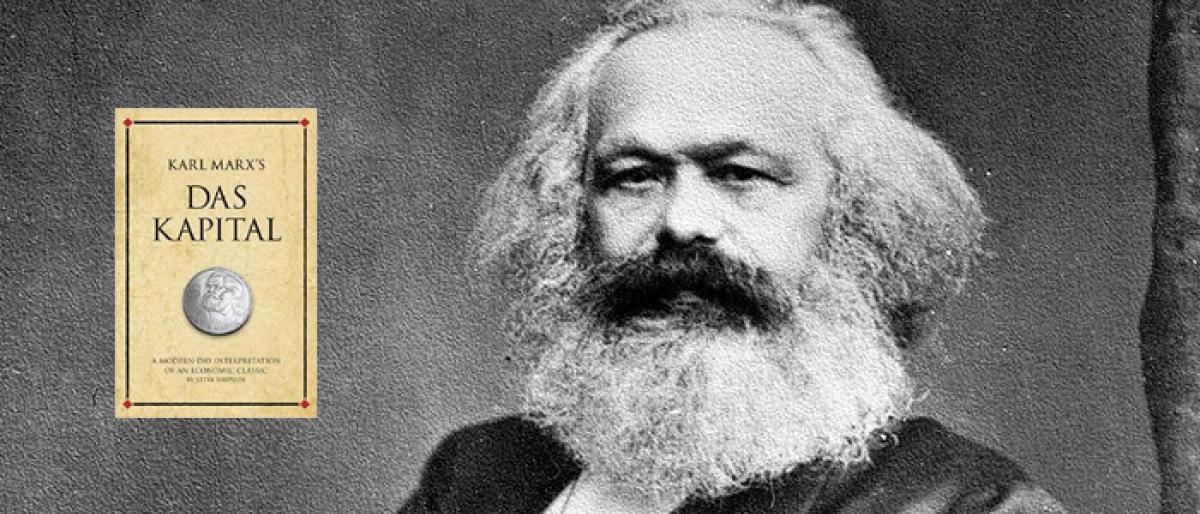Live
- SCDRC vested with authority to enforce orders, issue warrants, rules Delhi High Court
- RTC Driver Dies of Heart Attack While Driving Bus
- Rs 1,000 crore earmarked for venture fund to Indian space startups: Minister
- Rahul Gandhi has not improved, he's aligned with anti-national elements: Union Minister Rijiju
- AI can help improve advanced pain management, find researchers
- Haryana sees 67.90 pc polling, says Chief Electoral Officer
- Gujarat to mark 23 years of progress under Narendra Modi's leadership with 'Vikas Saptah'
- Women’s T20 WC: Too soon to say anything, medics are looking at it, says Smriti on Harmanpreet’s injury
- World Cerebral Palsy Day: Raising awareness key to build inclusive society
- Militants in Gaza fire three rockets into Israel
Just In

There are no two thoughts about it-the name of German philosopher Karl Marx will stay on for as long as mankind exists! The profound critic of capitalism proposed communism as an answer to the failings of the capitalist system. His theories, irrespective of how one takes it, are to be appreciated and admired for its profound on the society.
There are no two thoughts about it-the name of German philosopher Karl Marx will stay on for as long as mankind exists! The profound critic of capitalism proposed communism as an answer to the failings of the capitalist system. His theories, irrespective of how one takes it, are to be appreciated and admired for its profound on the society.
Even as the world remembers the great 19th century thinker on his bi-centenary celebrations on May 5 of this year, it goes without saying that his ideas will stay relevant for at least another century. He cautioned against an impending worker-owner rift almost two centuries back, a fore-thought that stays deep-rooted in the administrative functioning of several Communist governments.
Marx always fought for improving the life of the working class and contributed his treatise ‘Das Kapital’, a magnum opus earned that earned him immortality, so to say. Born on May 5, 1818, he passed away 64 summers later on March 14, 1883.
Marx ‘discovered’ the law of the evolution of human society and considered that it was determined by their material conditions or personal relationships, which people have with each other for producing and reproducing as a means to perpetuate human existence. His theories about society, economics and politics, collectively hailed as ‘Marxism’. hold that human societies develop through class struggle.
He classified society into two social groups-the labour (proletariat) who earn their livelihood with sweat and toil that benefits their employer while the second, according to the great thinker, are the capitalists who get their income from the surplus value they get from the labour that actually creates wealth. He contended that the income of the capitalists essentially revolved around exploitation of the workers. Marx held the opinion that of all the classes that confront the capitalist class, only the working class is the revolutionary.
His work laid the basis for much of the subsequent understanding of labour and its relation to capital. He mooted the theory of alienation concerning the worker under capitalism, which was one of the most influential concepts of his early work. He comprehensively analysed capitalism as it was the stage he lived in and predicted that it would eventually be replaced first by socialism and then communism.
‘Das Kapital’ is a three-volume work, whose principle idea was that the motivating force of capitalism is in the exploitation of labour, whose unpaid work was the ultimate source of surplus value. He strongly advocated that it was not the pressure of population that drives the wages of the worker to subsistence level but rather the existence of a large army of unemployed, which is in absolute interest of the capitalists and increases with accumulation of capital.
Das Kapital was the foundational theoretical text of communist philosophy, economics and politics and one of the most influential works in history. His labour theory of value is a classic, which states that the economic value of goods or service is determined by the total amount of socially necessary labour required to produce it.
It was his works in economics that influenced subsequent economic thought and laid the basis for much of the present day understanding of labour and its relation to capital. On the political front, he co-authored Communist Manifesto along with his close friend Friedrich Engels. This argued that class struggles or the exploitation of one class by another are the motivating force behind all historical developments. It reflects in today’s modern industrial society which is characterised by class conflict between the bourgeoisie and proletariat. Among the four parts of this manifesto, he discussed the relationship between the Communists and other parties in the last section.
On the whole, Karl Marx became the most influential figures of the 19th century across the globe through his works. In the subsequent century the world witnessed many revolutions in various countries. The men behind such upsurges prided themselves as ‘Marxist’ followers.
The Russian Revolution is a classic instance in this category. This also led to the foundation of the world’s first socialist state called the Soviet Union. Other great world leaders like Vladimir Lenin, Mao Zedong and Fidel Castro cited Marx as an influence. Many scholars believe that his theories on the exploitative relationship between capitalist employers and their employees remain valid even today.
By: Dr V Pradeep Kumar

© 2024 Hyderabad Media House Limited/The Hans India. All rights reserved. Powered by hocalwire.com







